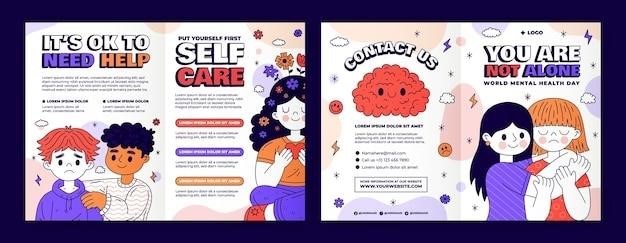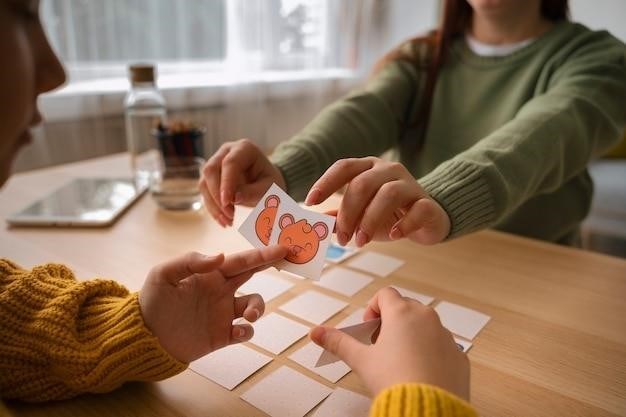Social-Emotional Learning (SEL) Activities⁚ A Comprehensive Guide
This guide offers a comprehensive overview of social-emotional learning (SEL) activities‚ encompassing various resources and strategies. Explore practical applications for enhancing self-awareness‚ managing emotions‚ fostering empathy‚ and building healthy relationships. Discover free resources and classroom implementation ideas to support student well-being. Downloadable PDFs provide additional worksheets and lesson plans.

Understanding Social-Emotional Learning
Social-emotional learning (SEL) is the process of developing crucial skills for managing emotions‚ navigating relationships‚ and making responsible decisions. It’s not just about academics; it’s about building the emotional intelligence necessary for success in life. SEL equips individuals with the ability to understand and manage their own feelings‚ empathize with others‚ and build positive relationships. This involves self-awareness‚ self-management‚ social awareness‚ relationship skills‚ and responsible decision-making. These five core competencies work together to create well-rounded individuals capable of thriving in various settings. Effective SEL programs integrate these skills into daily life‚ fostering a supportive environment where students can learn and grow emotionally. Many resources‚ including downloadable PDFs‚ offer activities and lesson plans to facilitate this learning process‚ making it accessible both in and out of the classroom.
SEL is crucial for academic success‚ as students who can manage their emotions and build positive relationships are better equipped to focus on learning. It also contributes to overall well-being‚ reducing stress and anxiety‚ and promoting mental health. By cultivating these vital skills‚ SEL empowers individuals to achieve their full potential‚ both personally and professionally. The integration of SEL into educational settings fosters a positive learning environment conducive to academic achievement and personal growth.

The Five Core Competencies of SEL
Social-emotional learning (SEL) is built upon five interconnected core competencies⁚ Self-awareness involves understanding one’s emotions‚ strengths‚ and weaknesses. Self-management focuses on regulating emotions‚ setting goals‚ and managing stress effectively. Social awareness emphasizes empathy‚ understanding diverse perspectives‚ and recognizing the emotions of others. Relationship skills encompass communication‚ collaboration‚ conflict resolution‚ and building positive relationships. Finally‚ responsible decision-making integrates ethical reasoning‚ considering consequences‚ and making choices aligned with personal values and goals. These competencies are not isolated but rather interwoven‚ supporting each other to develop well-rounded individuals. Many resources‚ including downloadable PDFs‚ offer activities and lesson plans designed to build these skills progressively.
Mastering these competencies is crucial for navigating life’s challenges. They equip individuals with the tools to manage stress‚ build healthy relationships‚ and make sound judgments. This holistic approach to development prepares individuals for academic success‚ career fulfillment‚ and overall well-being. The emphasis on interconnectedness underscores the importance of a comprehensive approach to SEL education‚ recognizing the synergistic effect of these five competencies in promoting personal growth.
SEL Activities for Self-Awareness
Cultivating self-awareness is foundational to social-emotional growth. Numerous activities promote this crucial skill. “A Rose and a Thorn‚” a simple yet effective exercise‚ encourages reflection on positive experiences (“roses”) and challenges (“thorns”)‚ fostering self-awareness and emotional processing. Journaling prompts‚ focusing on personal strengths‚ feelings‚ and reactions to various situations‚ offer a private space for introspection and self-discovery. Mindfulness exercises‚ such as guided meditations or breathing techniques readily available in many downloadable PDFs‚ help individuals connect with their inner selves and increase emotional regulation. Interactive group reflections‚ where participants share their experiences and perspectives in a supportive environment‚ promote self-awareness through shared understanding. These activities encourage students to recognize and understand their emotions‚ strengths‚ and limitations‚ laying a strong foundation for building healthy relationships and making responsible decisions. Many free online resources offer adaptable activities tailored for diverse learning styles and age groups.
Activities for Self-Management and Stress Reduction
Effective self-management is crucial for navigating daily challenges and building resilience. Several activities promote self-regulation and stress reduction. Deep breathing exercises‚ readily accessible through various online resources and downloadable PDFs‚ are simple yet powerful tools for calming the nervous system. Mindfulness practices‚ such as body scans or guided meditations‚ cultivate present moment awareness‚ helping individuals manage overwhelming emotions. Progressive muscle relaxation techniques‚ often included in SEL workbooks‚ involve systematically tensing and releasing muscle groups to relieve physical tension associated with stress. Journaling can serve as an outlet for processing emotions‚ clarifying thoughts‚ and identifying personal stress triggers. Engaging in physical activity‚ even short bursts of exercise‚ releases endorphins and reduces stress hormones. Teaching children emotional vocabulary and providing opportunities to express their feelings verbally or creatively are vital components of self-management. The incorporation of these activities into daily routines builds coping mechanisms to navigate stressful situations effectively. Remember‚ many free resources offer valuable activities and worksheets.
Promoting Social Awareness Through Activities
Cultivating social awareness is key to fostering empathy and understanding in students. Role-playing scenarios‚ readily available in many SEL activity PDFs‚ allow students to step into others’ shoes and consider diverse perspectives. Discussions about current events or social issues encourage critical thinking and awareness of societal challenges. Analyzing literature or films that depict various social situations helps students understand the complexities of human interactions and emotions. Community service projects provide hands-on experiences with diverse populations and foster a sense of social responsibility. Observational activities‚ like analyzing group dynamics or nonverbal communication‚ enhance awareness of social cues. Games that emphasize collaboration and cooperation promote understanding and respect for differing viewpoints. Interactive simulations that model real-life social situations offer valuable learning opportunities. These varied activities‚ often found in free online resources and downloadable workbooks‚ help students develop a deep understanding of the social landscape and foster compassion for others. Remember to adapt activities to suit diverse learning styles and needs. Regular reflection prompts help students internalize their learning and refine their social awareness.
Developing Relationship Skills⁚ Activities and Games
Strengthening relationship skills is crucial for social-emotional growth. Collaborative games‚ often featured in SEL activity PDFs‚ promote teamwork and communication. These activities encourage students to work together towards a common goal‚ fostering cooperation and mutual respect. Conflict resolution exercises‚ readily available in many resources‚ teach students effective strategies for navigating disagreements and finding peaceful solutions. Role-playing scenarios help students practice assertive communication and empathy in various social situations. Discussions about healthy relationships and boundaries provide a framework for understanding respectful interactions. Empathy-building activities‚ such as perspective-taking exercises‚ encourage students to understand and appreciate others’ feelings and experiences. Partner or group activities that require negotiation and compromise build valuable skills in collaboration and conflict resolution. Creative projects‚ like collaborative storytelling or artwork‚ foster teamwork and shared accomplishment. Regular class meetings‚ incorporating check-ins and discussions‚ provide opportunities for students to connect with each other and build a sense of community. These activities‚ easily adaptable for various age groups and learning styles‚ contribute significantly to the development of positive and healthy relationships.
Responsible Decision-Making Activities
Cultivating responsible decision-making is a cornerstone of social-emotional learning. Many readily available SEL activity PDFs offer structured exercises to develop this crucial skill. Case studies presenting ethical dilemmas challenge students to analyze situations‚ consider consequences‚ and justify their choices. Role-playing scenarios allow students to practice navigating complex situations and making informed decisions under pressure. Decision-making matrices help students systematically weigh the pros and cons of different options‚ fostering a thoughtful approach to problem-solving. Discussions about the impact of decisions on oneself and others emphasize the importance of considering the broader implications of choices. Goal-setting activities encourage students to establish clear objectives and develop action plans to achieve them. Analyzing real-life examples of responsible and irresponsible decision-making provides valuable context and reinforces learning. Interactive simulations‚ often found in digital SEL resources‚ engage students in dynamic decision-making scenarios with immediate feedback. These activities‚ complemented by reflective journaling prompts‚ encourage self-assessment and continuous improvement in decision-making skills. By consistently practicing these techniques‚ students develop the ability to make informed‚ responsible choices that positively impact their lives and the lives of others.
Utilizing Technology for SEL Activities
Technology significantly enhances the delivery and engagement of social-emotional learning activities. Interactive online platforms offer a wide range of SEL games and simulations‚ providing immediate feedback and personalized learning experiences. Educational apps cater to diverse learning styles‚ making SEL accessible and enjoyable for all students. Virtual reality (VR) experiences can immerse students in realistic scenarios‚ allowing them to practice social skills and emotional regulation in safe‚ controlled environments. Educational videos and animated content effectively convey complex concepts and engage younger learners. Online forums and discussion boards foster peer-to-peer learning and the sharing of experiences‚ strengthening a sense of community. Digital storytelling tools empower students to express their emotions and experiences creatively‚ promoting self-awareness and emotional intelligence. Data-driven platforms track student progress and provide valuable insights for educators to tailor instruction and support individual needs. The use of technology enhances accessibility‚ offering personalized learning experiences tailored to individual student needs‚ particularly beneficial for students with diverse learning styles or disabilities. Furthermore‚ digital resources often include readily available downloadable PDFs‚ making these materials easily accessible for offline use or integration into existing curricula.
Finding and Using Free SEL Resources
Numerous free social-emotional learning (SEL) resources are available online‚ offering a wealth of materials for educators and parents. Websites dedicated to SEL provide downloadable PDFs containing worksheets‚ lesson plans‚ and activity guides. These resources often cater to different age groups and skill levels‚ ensuring adaptability to various contexts. Many organizations offer free webinars and online workshops‚ providing professional development opportunities for educators to enhance their understanding and implementation of SEL strategies. Educational platforms and online communities share free SEL resources‚ fostering collaboration and knowledge-sharing among educators. Government websites and educational agencies frequently publish free SEL curricula and materials‚ aligned with national standards and best practices. Open educational resources (OER) initiatives provide access to free and openly licensed SEL materials‚ promoting equitable access to quality education. Remember to critically evaluate the credibility and alignment with your specific needs before implementing any free resource. By carefully selecting and adapting these materials‚ educators can effectively supplement existing curricula and provide enriching SEL experiences for students.
Implementing SEL in the Classroom and at Home
Integrating social-emotional learning (SEL) effectively requires a multifaceted approach‚ encompassing both classroom and home environments. In the classroom‚ teachers can incorporate SEL activities into daily routines‚ using morning meetings‚ circle time‚ or brief breaks for mindfulness exercises. Integrating SEL into existing lessons enhances engagement and provides opportunities for skill development. Classroom discussions and group projects can facilitate social awareness and relationship building. Teachers should model appropriate social-emotional behaviors and provide explicit instruction on SEL skills. At home‚ parents can engage in activities promoting emotional regulation and self-awareness. Family dinners or games can foster communication and emotional connection. Reading books together and discussing characters’ emotions promotes empathy. Parents should actively listen to their children’s concerns and validate their emotions. Establishing consistent routines and setting clear expectations promotes self-management. By working collaboratively‚ schools and families can create a supportive environment where children develop essential SEL skills‚ leading to improved academic performance‚ mental well-being‚ and overall success.
